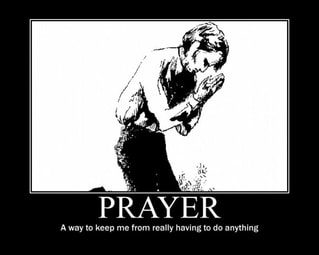Prayer

December 5, 2021:
“Rejoice always, pray without ceasing, give thanks in all circumstances; for this is the will of God in Christ Jesus for you” (1 Thessalonians 5:16-18). The Greek word ceasing in this verse literally means to pray uninterrupted and continually, without omission or intermission. And nowhere in the Bible is there a follow up verse that says “unless you’re really busy.”
Seems rather difficult to think one can continually pray and still go about even simple tasks in our daily lives. We breath without thinking and aren't aware of it without ceasing. So can we pray like we breath?? And if we could pray like we breath would it still be prayer if we were unaware we were doing it?
Praying unceasingly has at least four elements:
1) a constant awareness of and gratitude for the Lord’s great gifts to us.
2) Prayers about every aspect of our lives.
3) A continual attitude of dependency and trust in the Lord.
4) Living the gospel constantly, so that we are worthy to be in constant communication with the Lord.
So there's probably no need to actually repeat the Lords prayer over and over again all day long or spend your whole day on your knees. But an unceasing continual attitude of dependency would be beneficial. That keeps us mindful of who is in charge.
Merriam-Webster dictionary defines prayer as "an address (such as a petition) to God or a god in word or thought." Praying is really no more of a chore if we are doing what Jesus said was the greatest commandment anyway: "To Love the Lord thy God with all they heart, mind and soul (Matt 22).
Most people know of the game "Six Degrees of Kevin Bacon" where you can pick any actor and connect him/her by six degrees or less to Bacon via another actor through film or some other connection. There is a stronger connection with usually less degrees to connect most anything the Bible says we should do or even not do to the words of Jesus in Matthew 22.
Everything in our lives as Christians should have in its foundation "to love the Lord they God with all our heart, mind and soul." The second part of that declaration was to "love your neighbor as yourself." But taking care of the first part envelopes the second. It also brings us into a place where we pray without ceasing.
“Rejoice always, pray without ceasing, give thanks in all circumstances; for this is the will of God in Christ Jesus for you” (1 Thessalonians 5:16-18). The Greek word ceasing in this verse literally means to pray uninterrupted and continually, without omission or intermission. And nowhere in the Bible is there a follow up verse that says “unless you’re really busy.”
Seems rather difficult to think one can continually pray and still go about even simple tasks in our daily lives. We breath without thinking and aren't aware of it without ceasing. So can we pray like we breath?? And if we could pray like we breath would it still be prayer if we were unaware we were doing it?
Praying unceasingly has at least four elements:
1) a constant awareness of and gratitude for the Lord’s great gifts to us.
2) Prayers about every aspect of our lives.
3) A continual attitude of dependency and trust in the Lord.
4) Living the gospel constantly, so that we are worthy to be in constant communication with the Lord.
So there's probably no need to actually repeat the Lords prayer over and over again all day long or spend your whole day on your knees. But an unceasing continual attitude of dependency would be beneficial. That keeps us mindful of who is in charge.
Merriam-Webster dictionary defines prayer as "an address (such as a petition) to God or a god in word or thought." Praying is really no more of a chore if we are doing what Jesus said was the greatest commandment anyway: "To Love the Lord thy God with all they heart, mind and soul (Matt 22).
Most people know of the game "Six Degrees of Kevin Bacon" where you can pick any actor and connect him/her by six degrees or less to Bacon via another actor through film or some other connection. There is a stronger connection with usually less degrees to connect most anything the Bible says we should do or even not do to the words of Jesus in Matthew 22.
Everything in our lives as Christians should have in its foundation "to love the Lord they God with all our heart, mind and soul." The second part of that declaration was to "love your neighbor as yourself." But taking care of the first part envelopes the second. It also brings us into a place where we pray without ceasing.

"I too had noticed that our prayers for others flow more easily than those we offer on our own behalf. And it would be nice to accept your view that this just shows we are made to live by charity. I'm afraid, however, I detect too much less attractive reasons for the ease of my own intercessory prayers. One is That I am often, I believe, praying for others when I should be doing things for them. It's so much easier to pray for a bore than to go see him, and the other is like unto it. Suppose I pray that you may be given grace to understand your besetting sin (short lists of candidates for this post will be forwarded on demand). Well, all the work has to be done by God and you. If I pray against my own besetting sin, there will be much work for me. One sometimes fights shy of admitting an act to be a sin for this very reason." -CS Lewis
Jan 1, 2020: World Vision: 8 keys to a more powerful prayer life in 2020
I love Luke 5:16 because it shows that just like you and me, Jesus needed a break from the demands of his busy life to recharge his batteries and spend time with his Heavenly Father. The life of Christ is intended to give us examples we can follow and learn from. So, even though he was God incarnate, Jesus didn’t draw on his superpowers as the Son of God when it came to facing life’s challenges. Instead, when he was exhausted or burdened or in need of spiritual refreshment, he would “slip away” to pray — plugging into the power, perception, and purpose that can only be found in God’s presence.
I love Luke 5:16 because it shows that just like you and me, Jesus needed a break from the demands of his busy life to recharge his batteries and spend time with his Heavenly Father. The life of Christ is intended to give us examples we can follow and learn from. So, even though he was God incarnate, Jesus didn’t draw on his superpowers as the Son of God when it came to facing life’s challenges. Instead, when he was exhausted or burdened or in need of spiritual refreshment, he would “slip away” to pray — plugging into the power, perception, and purpose that can only be found in God’s presence.
“To fail to pray, then, is not to merely break some religious rule—it is a failure to treat God as God.” -- Timothy Keller
|
.....to say grace is to want to pronounce an "Amen" upon this world and its life. But to say a genuine Amen, one must also be able to affirm what is going on as good and right, because to say "Amen" is (literally) to say, "Let it be so." It is to want what has happened to happen again and again, because its occurrence is praiseworthy and beautiful. Learning to say grace: The theology and politics of eating
"At the risk of being accused of splitting hairs: Prayer does not change things. Attempting to alter the universe by the words you say isn't prayer; it's magic.
There's a difference. God changes things. He often sees fit to do so in response to prayers prayed; but He does the changing of things" --Johnny Price [Alleged Wisdom p19] |
“Prayer illuminates the difference between knowing God’s will and guessing at it.”
― Becky Tirabassi, Let Prayer Change Your Life
― Becky Tirabassi, Let Prayer Change Your Life






